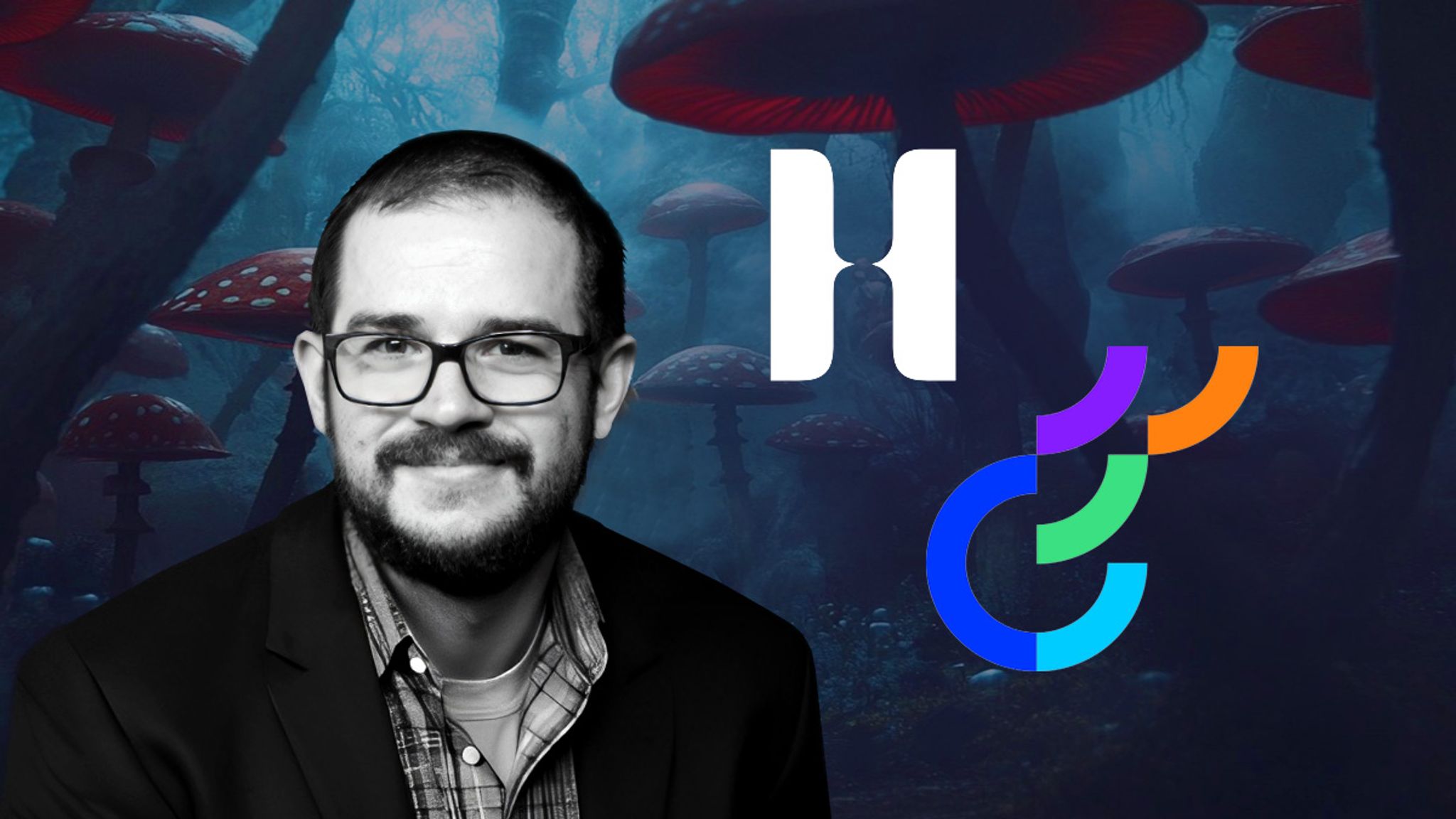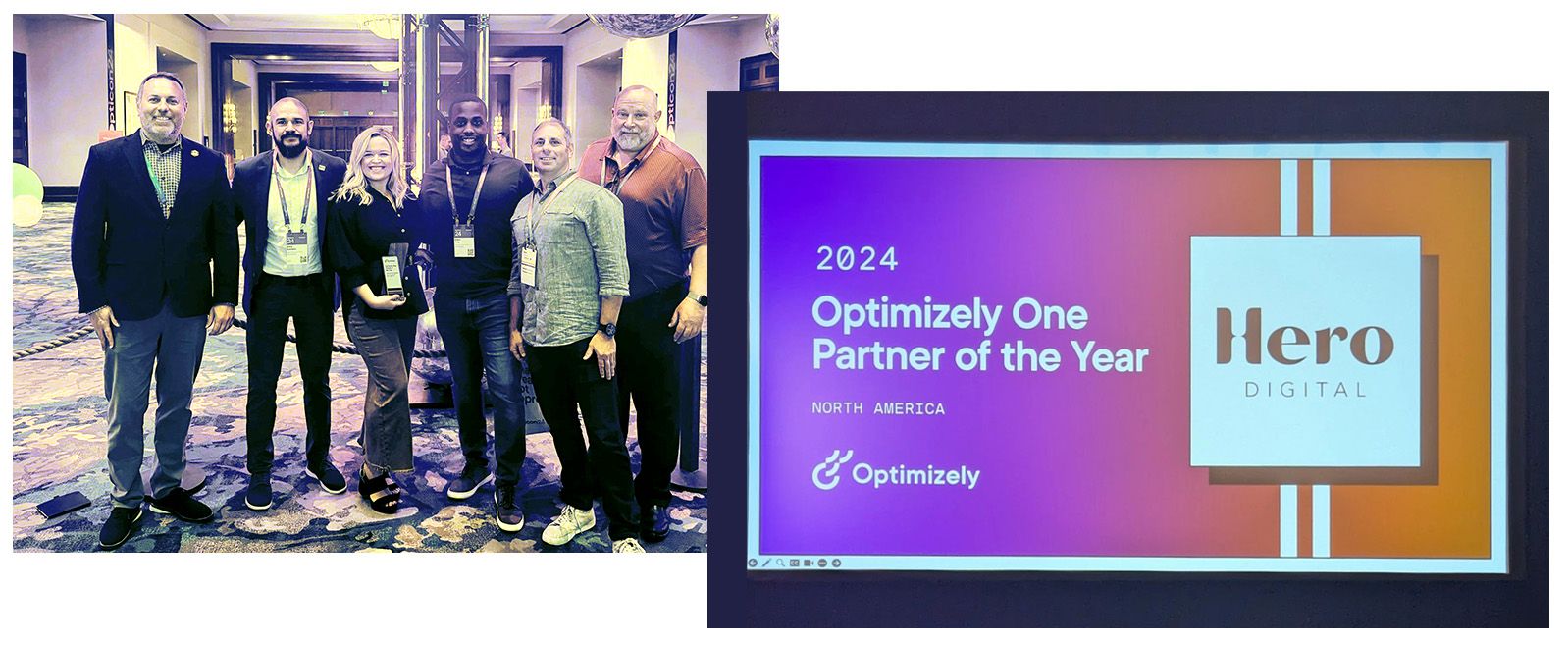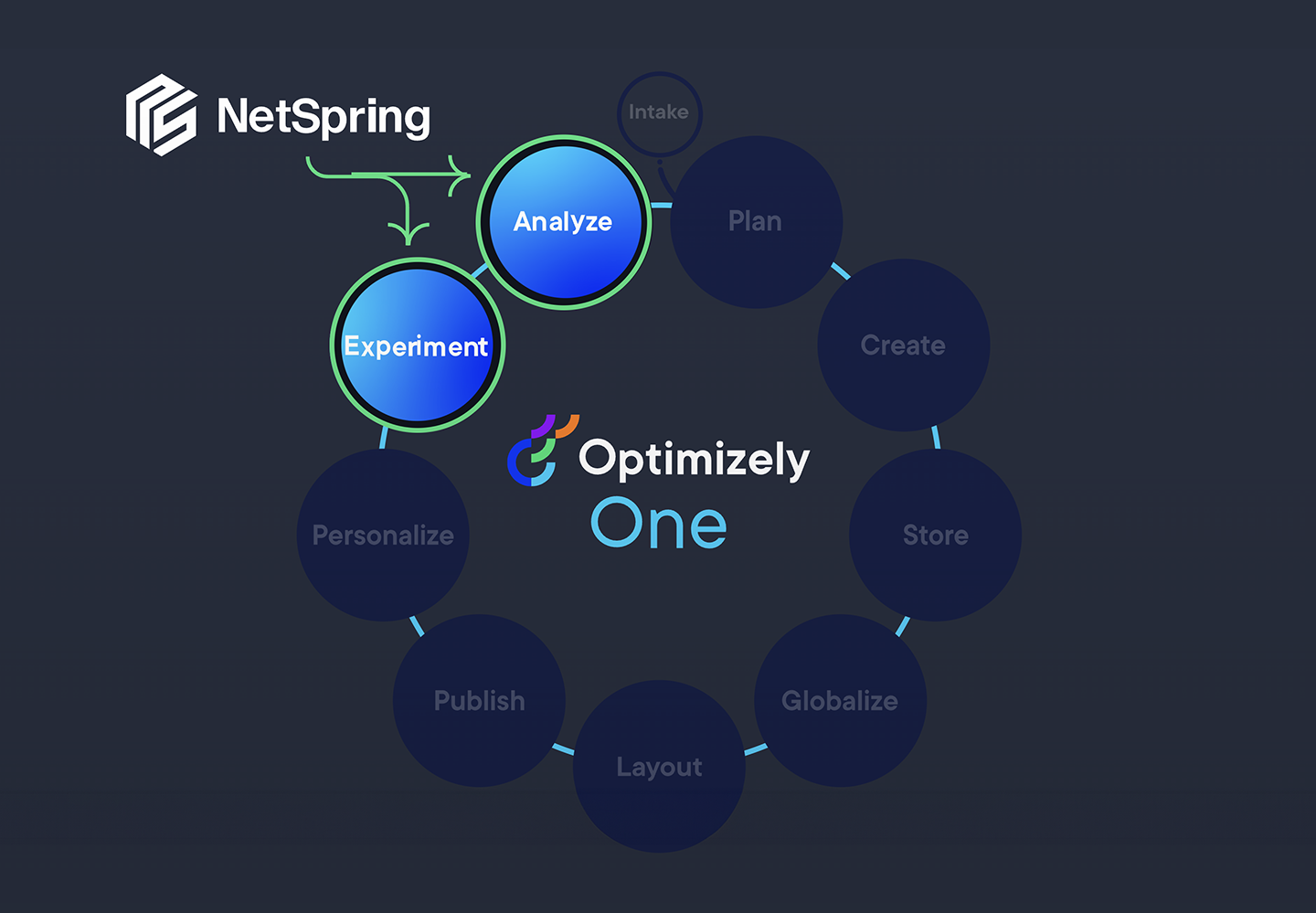Down the Agency Rabbit Hole: A Post-Opticon Chat with Chris Kostakis, CTO at Hero Digital

CMS and DXP vendors are betting big on their agency partnerships in 2025. As Optimizely wrapped its annual user conference last month, we followed the rabbit to the top of its partner ecosystem, hoping to get a better view of “Onederland” through the looking glass.
You know what they say about rabbits multiplying.
That might be one reason why Optimizely chose “Onederland” as the overarching theme of its 2024 Opticon User Conference. The name instantly conjures the feats of Alice, chasing her own rabbit down a hole in the ground and emerging in another world with a similar phonetic moniker.
Literary allusions aside, Optimizely has been performing its own multiplicative feats, notching sizeable increases in ARR. Earlier this year, the industry-leading DXP – which is also blazing trails as a content marketing and experimentation platform – surpassed $400 million while hitting four consecutive quarters of double-digit growth.
Again, rabbits multiplying.
This “Onederland” appellation was also an homage to its still-shiny Optimizely One platform, launched in 2023 and billed as the industry’s first “marketing operating system.” Per the Opticon branding, the company called it “the place where marketing dreams come true, where wonderful websites bloom like curious flowers.”
Curiouser and curiouser. That’s something Alice said, and perhaps apropos to this moment.
As someone who owned a digital agency for 17 years, I can say first-hand that curiosity is a big part of what makes good marketing magical. Agencies are a collective of curious people, restlessly pursuing big ideas with an inimitable drive for creative exploration.
Maybe Alice was a marketer herself, wondering how deep the hole really goes, contemplating the effectiveness of product messages like Eat Me or Drink Me (both successfully converted, for better or worse). The best marketers are bold and daring, and Optimizely has deeply tuned into these agency traits, providing innovative tools for executing, measuring, and optimizing bold campaigns.
Optimizely’s dedication to its channel can’t be understated. The company boasts over 700 partners and agencies worldwide, many of which have expansive practices that specialize in turnkey implementation and management. In fact, Platinum Partners like DEPT and Enterprise Solution Partners like Valtech have hundreds of practitioners focused on the Optimizely ecosystem.
So how are these partners doing right now?
Seeking the wisdom of the Cheshire Cat
In my discussions with CMS and DXP platforms over the last few months, I’ve noted a common theme in their strategies for 2025: a pronounced focus on digital agency partners as a critical channel for growth. I heard this from practically every CEO I've spoken to.
As the San Antonio leg of Opticon ’24 wrapped, I pondered how the marketer's role is evolving within the scope of technology tools and platforms, and how agencies are adapting to a new reality. The answer, to some extent, is coming from their tech stacks.
To be sure, 2024 was a strange trip. While industry leaders like Optimizely marked visible gains – again leading in the Gartner MQ for DXPs and topping the MQ for Content Marketing Platforms (CMPs) – the specter of AI has loomed heavily on the fortunes of the content industry. There were also big changes at the leadership level, from Sitecore to Kontent.ai, along with social and political unrest around the globe and a contentious U.S. Presidential election.
I wouldn’t call it a “life ring” or even a panacea for mounting woes, but it does feel like agencies have taken on a pronounced level of importance for vendors, like there’s an expectation they might take up some of the sales slack. That’s due to a myriad of reasons – the most important being the bedrock relationships they’ve forged with customers.
To that end, I wanted to go down the “agency rabbit hole” and explore “Onederland” through a partner’s looking glass. This was, after all, a user’s conference where partners were being celebrated amidst a backdrop of product announcements. What better place to reflect on how agencies are meeting these challenges and expectations with their DXP vendor?
While I connected with several people during and after Opticon, I followed the rabbit tracks to the top of the Optimizely ecosystem to speak with Chris Kostakis, Chief Technology Officer at Hero Digital. As CTO, he’s primarily focused on the DXP portfolio, weaving together the right solutions and properly configuring tools for customer use cases.

The Hero Digital team and their Optimizely One “Partner of the Year” Award at Opticon 2024. Source: LinkedIn.
With a hybrid workforce of over 500 talented practitioners around the globe, Hero is an award-winning agency with a keen focus on data-driven, value-oriented solutions. As their website claims, “We like to solve really hard problems.” As I said, marketers are a bold bunch.
Bolstered by a slew of successful projects built on the Optimizely One platform, Chris and team are no strangers to Opticon accolades. This year, they took home the coveted 2024 Optimizely One “Partner of the Year” Award – a testament to Hero’s ingenuity and its Optimizely pedigree.
So, was “Onederland” really a “Wonderland?” More on that in a minute.
Beware the Jabberwock
In Lewis Carroll’s Through the Looking-Glass, and What Alice Found There, one of the most prolific villains is a dragon dubbed the “Jabberwock.” It’s dark, malevolent, mysterious, and tacitly symbolic of fear.
In this hyperbolic digital market, agencies are fighting their own dragons, and it ain’t pretty. Rand Fishkind and his Sparktoro team recently published some breathtaking research on this subject, trying to determine how shops have been fairing over the last 12 to 24 months.
The central message was loud and clear: things are tough right now.
How tough? Of the survey respondents, only 10% said 2024 was “healthy” for them, and 44% said it was a struggle. Most agree that the new business pipeline is the most daunting challenge.
That said, many view 2025 with positivity, with the least amount of pessimism coming from agencies with over 250 employees. This is not surprising when you consider the fundamental advantages at the enterprise business level (e.g., mature systems and processes, multi-year contacts, lawyers, etc.).
One of the study’s most compelling data points was around AI. For agencies, its seems there’s no clear consensus. Most are split over the question of whether or not AI represents a significant threat to their business model – validating that we’re still early in the AI wave to understand the full breadth of its implications.
Why am I sharing this data? Because it’s important to underscore the pressure that agencies are under. Many factors are contributing to this, but the uncertainty is palpable. Vendors might provide a symbiotic salve for leads and opportunities, but the door is trying to swing both ways, each side hoping to capitalize on the other’s reach. At the same time, larger agencies are pedaling in multiple platforms, and vendors are coping with multiple partners to appease.
There will be winners and losers. Clearly, large agencies are better positioned to weather change by investing in new technologies, diversifying their practices, and pivoting to new opportunities. As AI and automation continue to sweep across the marketer’s toolkit – and services become more commoditized or displaced – we might see agencies struggle to maintain revenue at the same level.
We need a data hero
When I spoke to Chris Kostakis, he was audibly road-weary. Having just returned to his home base in Chicago after his agency’s big win in San Antonio, it would be fair to assume he was winded from the victory laps.
“We were awarded the Optimizely One ‘Partner of the Year,’ which is kind of this new category for working across the Optimizely One suite,” he said. “This is really a new definition for their entire suite of software.”
Obviously, this shift in product nomenclature is a critical one. The launch of Optimizely One as a “marketing operating system” was an audacious position, telegraphing a more holistic posture to the market. In essence, this ecosystem delivers the tools marketers need to collaborate, create high-quality content, personalize, test, and learn. For agencies, this means having a comprehensive platform for powering their entire marketing lifecycle – or helping enterprises consolidate control across their distributed teams.
When it comes to announcements at Opticon, I asked Chris what really stood out, specifically as it relates to Hero’s focus on Optimizely One. Interestingly, it was the momentum around the Netspring acquisition, which happened back in September. Now positioned as Optimizely Warehouse-native Analytics, the platform is gliding into the Optimizely One ecosystem to provide best-of-breed analytics capabilities with powerful experimentation.

Netspring will tie experimentation, analytics, and other data into the Optimizely One platform. Source: Optimizely.
“I think it makes a ton of sense for them,” he reflected. “Not only does it help with customer journey analytics, but it also [provides] data warehousing and reporting.”
According to Chris, what’s equally impressive is how quickly Optimizely was able to integrate Netspring into its own business systems. Within 30 days, the product was on wheels, allowing customers to tie experimentation and other digital experience data to business metrics that typically reside in data warehouses like Google’s BigQuery or Snowflake.
“A lot of these big vendors will purchase a piece of software, and they might not ever get it properly integrated into their stack for years, right? It might sit off to the side and not really fit anywhere. But Optimizely did a great job with [Netspring].”
More than that, the Netspring acquisition is filling a key need for agencies relative to the customer journey and personalization. It allows them to set up variations in Optimizely using the tooling they prefer, access data from any source, and validate it with analytics and visualization. It’s more of the meaningful data science marketers crave for optimizing performance.
Opal: The AI “ace in the hole”
Opal is Optimizely's AI assistant, which is fully accessible across its suite, helping to inform and accelerate every phase of the marketing lifecycle. Since its launch last year, Opal has seen a 500% increase in adoption among existing Optimizely customers, validating demand for intuitive, integrated, purpose-built AI capabilities across the marketing workflow.
At this year’s Opticon, the company leveraged Opal’s success to launch an array of AI agents for key marketing functions. This includes everything from content generation and campaign creation to project management and experimentation summaries.
I asked Chris for his perspective on Optimizely’s AI game. Remember, Sparktoro’s research suggests that agencies have a muddy disposition about the future of AI and how it might disrupt their business. But Optimizely is providing a roadmap and high-utility applications for how AI can enhance productivity and provide one-stop solutions with the option of model flexibility.
“Having the ability to bring your own [AI] model is a bit different than some of the other big vendors, which are using more of a ‘our model is the best approach.’ But it's still going to be a black box, and you're not really going to know how it functions. That doesn't work for companies with very unique cases, or ones that are worried about owning the underlying data.”
“I like their approach to AI,” he said. “Having the ability to bring your own [AI] model is a bit different than some of the other big vendors, which are using more of a ‘our model is the best approach.’ But it's still going to be a black box, and you're not really going to know how it functions. That doesn't work for companies with very unique cases, or ones that are worried about owning the underlying data. So I really like their approach there. That’s cool.”
Along those lines, Optimizely also announced that it was expanding its partnership with Google Cloud to increase access to Google’s Gemini models – which they can access directly through Opal and Optimizely One. This follows Optimizely’s announcement last month that its CMP is now available on Google Cloud Marketplace, making it easy for customers to procure and deploy via GCP.
While there’s still ample uncertainty to wrestle with, Optimizely’s roll with Opal could bring significant benefits to agencies as they look for ways to execute their own AI strategy in meaningful ways. Piggybacking on a proven set of integrated capabilities with the option to bring your own model is the right mix of AI features to help partners be successful – and it’s already catching on.
For Hero, Chris also sees AI driving greater value for their web and content operations, providing generative capabilities while automating and offloading the heavy lifting involved with traditional agency services. This is where the optimism really kicks in.
“We're not just a tech company,” he reinforced. “We do full-on branding, voice and tone, content creation – things like that. Generally, when a company comes to us, they don’t say ‘I need a new CMS,’ right? They also need new branding, or they want to refresh their website design. If we're updating the tone or changing the content model in a certain way, AI can help do a ton of that and it's only getting better. This whole concept of AI agents to help with content creation and across systems and things like that, I think there's a huge value in those use cases.”
Off with their heads? Not in this service relationship
Agencies are service ecosystems – always have been. In addition to more traditional forms of blended consultingware, they offer an array of brand and digital transformation services like web and app development, lift-and-shift migration, CMS deployment, SEO, and other cottage capabilities that we’re all familiar with.
More recently, we’ve seen agencies evolving the vector, trying their hand at the development of composable DX accelerators by assembling services that reduce friction and speed up time to market with platforms like AEM. It’s having a moment, but I’ve heard from several customers that some accelerators lack the right amount of product thinking to achieve success.
When it comes to their own technology stacks, agencies rely on the same fuzzy factor with vendors – which can make or break their success. If there’s a Queen of Hearts in the mix, she’s lurking in this part of the deck.
I asked Chris how the support piece has been with Optimizely, and if they’re helping his team keep their heads on when it matters most.
“Oh, absolutely, yes,” he replied. “And not just from a sales and marketing perspective, but from a customer perspective as well. We do a lot of challenging things with their software and have a pretty robust customer base that tends to push CMSes to the extreme. And with Optimizely, on the product support side, they're super supportive. They engage directly with my engineers. We have a Teams channel where we can ask questions and get help. And we need things like that. I really like that aspect of our relationship.”
In the past, agencies have often hit the wall with vendor support, forced to work within rigid systems with limited flexibility and accessibility. Now, with so much choice and commoditization in the market, platforms are using their service experience to help differentiate their value and enhance loyalty around product preference. As Chris noted, with Optimizely, this goes beyond the technical range.
“It’s the same thing on the go-to-market side,” he said. “Optimizely is very good with enablement. They take our feedback and reflect it on their roadmap, so we know where they're going.”
Composability: a mad tea party?
Over the past year, Optimizely and its monolithic peers have made solid strides in becoming more composable. Their discrete offerings are significantly more modular and most have introduced their own headless options. It’s a far cry from the MACH Alliance’s definition of composability, but nonetheless, it indicates how a composable posture has become essential to success.
I asked Chris how important composability is to Hero and its customers. As contemporary technologists, we tend to focus on this question when analyzing tools. But in the agency world, how is this translating into value for end customers?
“When it comes to composability, there's three categories of clients,” he explained. “First, there are those who deeply understand composability and are engineering-centric. They have good alignment with their business teams, and they know the value. But those are few and far between, right? Even most of those need help getting up and running because they don't quite understand how to do it properly.”
The second class, as Chris pointed out, sees composable as a “band-aid” for what might be a dysfunctional organization. Sure, a composable approach might help, but you can't expect it to achieve what traditional vendors bring to the table. As Chris further explained, many customers have either a bad relationship with their IT department or labor under the delusion they can weave all the necessary pieces together – and never have to deal with IT.
"Having a composable technology stack will enable agility, but it’s not the answer to agility. If your business is not operating in that way, you still need to fix the underlying business problem before it's effective.”
“I'll get the stack I want with all the software upgrades, and that's just not true,” he said. “You actually need to have a pretty good relationship with these softwares to work properly. Having a composable technology stack will enable agility, but it’s not the answer to agility. If your business is not operating in that way, you still need to fix the underlying business problem before it's effective.”
The third class of clients simply have no idea about composability or headless. They just come to Hero asking for a new website with specific parameters – and in many cases, they don’t understand what they’re asking for. As Chris relayed, these customers require frank conversation and education to overcome the complexity. While a composable stack might work, sometimes a platform like Optimizely can offer the least complicated solution.
“I just talk about the benefits of an architecture and why their business needs it,” he said.
That's the best way to avoid the Mad Hatter turning a tea party into a train wreck.
Finding the real “Onederland”
Considering the challenges that many agencies face in this climate, I’m left wondering: is there a place where marketing dreams really do come true? Where these amazing websites Optimizely described “bloom like curious flowers?”
Maybe. What's more likely is that agency leaders are experiencing a bout of night sweats, concerned about the future of their business and how a myriad of factors – including AI – might be challenging their prosperity.
And yet, it’s telling that many of the respondents in Sparktoro’s survey are viewing the future with optimism. It’s a stark contrast to their current sentiment, but perhaps the shift is already happening. For shops like Hero Digital, it might be the challenges themselves that are driving the positive outlook – and a big part of delivering that work is the quality of their partnerships with technology vendors.
I asked Chris about his own pursuit of passion and how Hero’s thinking and creativity – and its promise to customers – is reinforced by Optimizely.
“What I really like is that we get to do challenging things for our clients, and that we're doing them the right way,” he said. “We work hard on these different projects, and we do challenging things creatively. We do push the tools in ways that other companies don't.”
And you don’t get to do that without an underlying collaboration, one that serves the goals of both the agency and the vendor. This is where partnerships are really proving their value.
There’s always going to be some bias in the machine. We like the tools we like, and we’re often incentivized to use them – even when other platforms might be a better fit (the old square peg and round hole analogy). Many agencies are laser-focused, specializing in a single CMS or DXP platform, while others represent a multitude. As technologists and practitioners, we should commit to agnosticism wherever possible, to be unopinionated in our recommendations.
But as humans and business owners, it’s not always so simple.
One thing that’s resoundingly clear is that Optimizely is supporting partners like Hero in meaningful ways. They’re targeting the roadmap in the right direction and listening to feedback. It’s the kind of relationship agencies need to climb the hill ahead, and it's the trusted foundation vendors are seeking to cultivate preference for their platforms.
Yes, CMS and DXP vendors are banking on their channels to drive business in 2025. Agencies, too, are looking for more help from their technology partners. In this sense, they're betting on each other to deliver opportunities and possibilities.
Maybe “Onederland” is more than a whimsical place where an agency can achieve the impossible. Perhaps it’s just a creative reminder that together, we can peer through the looking glass to the future and do great things.
And if we’re lucky, get the rabbits multiplying.
Looking for guidance on Optimizely? Talk to us.
Upcoming Events

CMS Kickoff 2025
January 14-15, 2025 – St. Petersburg, Florida
Meet industry leaders at our third annual CMS Kickoff – the industry's premier global CMS event. Similar to a traditional kickoff, we reflect on recent trends and share stories from the frontlines. Additionally, we will delve into the current happenings and shed light on the future. Prepare for an unparalleled in-person CMS conference experience that will equip you to move things forward. This is an exclusive event – space is limited, so secure your tickets today.

CMS Summit 25
May 13-14, 2025 – Frankfurt, Germany
Don't miss the first European edition of our prestigious international conference dedicated to the global content management community! CMS Summit 25 will bring together top-notch speakers, our renowned learning format, and engaging social events. Hear from leading practitioners like Deutsche Bahn, Dr. Oetker, and more – and join customers, agencies, and CMS vendors as we discuss current trends and what's ahead for the content and digital experience fields. Connect and network at the only vendor-neutral, in-person conference focused on CMS. Space is limited for this exclusive event, so book your seats today.
